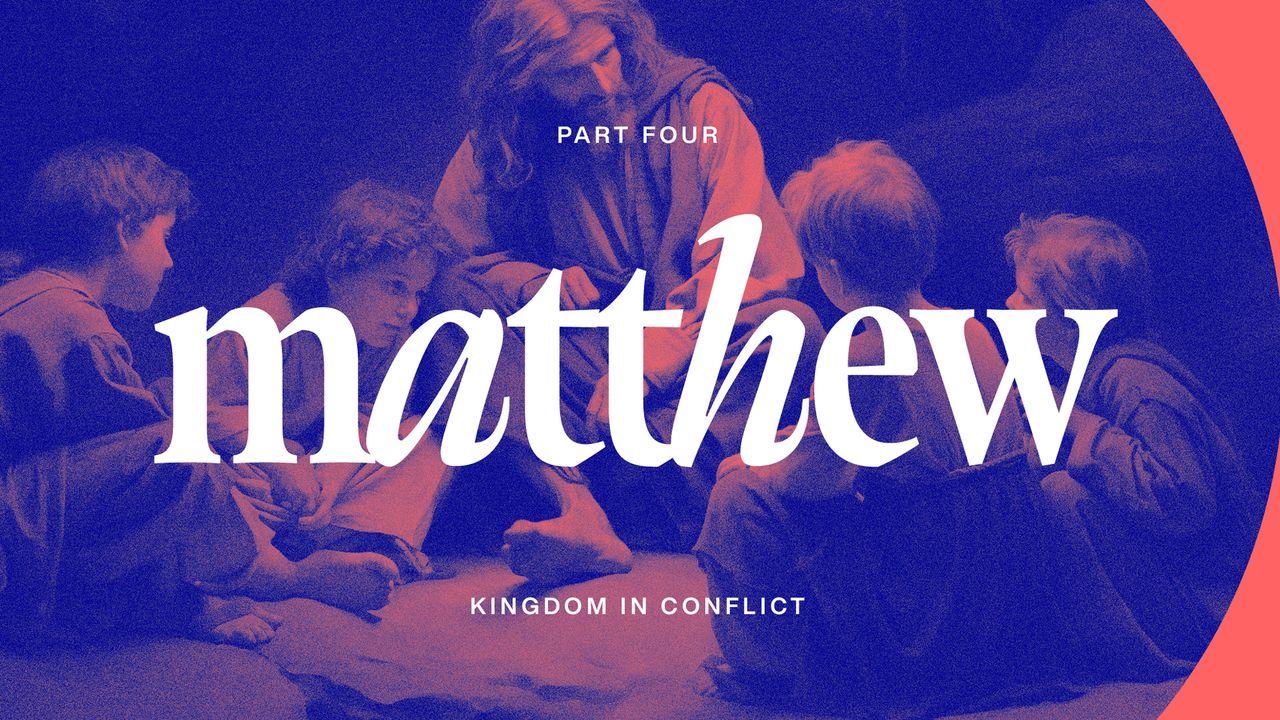Matthew 13-20: Kingdoms in ConflictSample

Trusting in God's Abundance
By Romina Chevren
“Now when it was evening, the disciples came to him and said, ‘This is a desolate place, and the day is now over; send the crowds away to go into the villages and buy food for themselves.’ But Jesus said, ‘They need not go away; you give them something to eat.’ They said to him, ‘We have only five loaves here and two fish.’ And he said, ‘Bring them here to me.’ Then he ordered the crowds to sit down on the grass, and taking the five loaves and the two fish, he looked up to heaven and said a blessing. Then he broke the loaves and gave them to the disciples, and the disciples gave them to the crowds. And they all ate and were satisfied. And they took up twelve baskets full of the broken pieces left over. And those who ate were about five thousand men, besides women and children.”—Matthew 14:15–21 (ESV)
The miracle of the feeding of the five thousand is a beloved and well-known story from the Bible. In this remarkable event, we witness Jesus' extraordinary act of provision, compassion, and divine abundance, which imparts valuable lessons about trusting in God's sufficiency in the face of scarcity.
Here, the disciples found themselves in a challenging situation. They were in a desolate place, evening was approaching, and a vast crowd had gathered to hear Jesus. Faced with the practical concern of feeding this multitude, the disciples suggested sending the people away to find food for themselves. It was a reasonable proposal given their perceived limitations.
Many of us can relate to such moments in life when challenges seem insurmountable, and we feel powerless to address them. Jesus responded to their concerns with a powerful statement: "They need not go away; you give them something to eat." This response is a reminder that even in the face of our limitations, God invites us to participate in His work. He calls us to be instruments of His grace and provision in the lives of others. Jesus saw an opportunity for a miraculous demonstration of God's power.
The disciples; however, were confronted with their own inadequacy. They possessed only five loaves of bread and two fish, which seemed utterly insufficient to feed such a massive crowd. But Jesus didn't ask for what they didn't have; He asked for what they did have. He wanted their willingness to surrender their meager resources, trusting that God could multiply them.
As Jesus took the five loaves and two fish, He looked up to heaven and said a blessing. Then, He broke the loaves and gave them to the disciples to distribute among the crowds. Incredibly, as they handed out the food, it multiplied miraculously. Not only were the people fed, but there were also twelve baskets of leftovers—more than they had started with. This miracle demonstrated God's unlimited ability to provide abundantly, exceeding their expectations.
The feeding of the five thousand offers profound spiritual lessons for our lives: First, it teaches us to trust in God's provision. Just as Jesus multiplied the loaves and fish, God can multiply the resources available to us when we trust in His provision. Even when we feel inadequate, God's abundance is more than sufficient to meet our needs.
Second, it encourages us to be willing to offer what we have. We may not possess vast resources, but God can use our willingness to surrender what we have, no matter how meager it may seem. In His hands, our little can become much.
Third, it reminds us of the importance of active participation in God's work. Just as the disciples were actively involved in distributing the multiplied food, we, too, are called to participate in God's plan for the well-being of others. We can use our gifts, talents, and resources to bless those in need.
And finally, witnessing God's miracles bolsters our faith. When we trust in God's abundance and actively participate in His work, we experience His miraculous provision and encounter His grace in our lives. It reminds us that nothing is impossible with God, and our faith is strengthened.
Pause: Take a moment to read these verses one more time and consider the significance of this miraculous event in the lives of Jesus and His disciples. Try to picture the scene, the hungry crowd, the disciples' concern, and Jesus' response.
Practice: Emulate the disciples' willingness to share what they had, even if it seemed inadequate. Practice generosity in your life by giving to those in need, whether it's your time, talents, or resources. God can multiply your acts of kindness..
Pray: Heavenly Father, Lord, help us to trust in Your provision, even in the face of scarcity or impossibility. Strengthen our faith to believe that You can multiply our resources, talents, and efforts when we offer them to You. Teach us the importance of generosity and sharing. May we be willing to give freely, knowing that You can take our meager offerings and turn them into abundance for the benefit of others. We thank You for Your miraculous provision and for the reminder that nothing is impossible with You. May we carry the lessons from this passage in our hearts and live them out in our daily lives. In Jesus' name, we pray. Amen.
Scripture
About this Plan

In part four of this verse-by-verse breakdown of the Gospel of Matthew, we'll work our way through Matthew 13-20.
More
We would like to thank Calvary Chapel Ft. Lauderdale for providing this plan. For more information, please visit: https://resources.calvaryftl.org
Related Plans

Anne Neilson's Christmas Angels: A 5-Day Plan to Focus Your Heart for Christmas

The Miracle in the Mirror

Go Tell It on the Mountain! - Christmas Devotional With 3 Little Words

The God of Times and Seasons

Honest Faith: Bringing Your Doubts to God

Essentials for the New Year

The Wonder We Lost

Ready, Set, Bloom

Every Day Relationship - 21 Days
